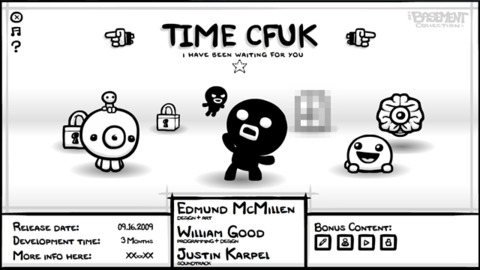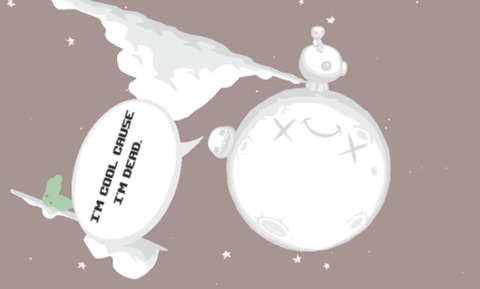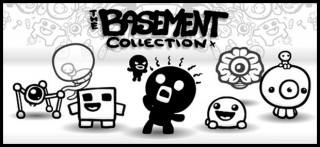An interesting yet disappointing collection
By now, Edmund McMillen has become a staple in the indie game development community; between his role in the hit documentary Indie Game: The Movie and his half of the development for Super Meat Boy he now ranks among the indie greats such as Jonathan Blow, the developer of Braid. So now we have The Basement Collection, which is a motley crue of games previously created -- alongside varying partners -- by McMillen, that is also chock full of extras that may, depending how much you care about the development process of games, tickle you pink.
The content in the package is structured very simply: there are 7 “core” games in the package that are playable from the get-go, and then there is a plethora of unlockable content. The way that unlocking works in the game is that each of the 7 core games is tied to an unlockable item – with these either being a game, video footage, sketch books, etcetera. Alongside each game unlocking something completely different, they also unlock extras from within each game such as sketchbooks, audio Q&As, and even segments from Indie Game: The Movie that can be watched. This method of unlocking new content by beating each game isn't anything new, but I do have a few problems with it. For one, you have no clue what you are unlocking ahead of time. While you can see what will be unlocked for each individual game, the main unlockable items on the menu’s carousel simply appear as padlocks that indicate which game you must beat to unlock the item: but no indication is given to the nature of that item. I understand that they would like it to be a surprise, but similar to how you go for the upgrades you want in an unlockable tree in other games, I’d have preferred being able to go after the unlocks I wanted first rather than beating a hard game just to unlock a sketch book about a different game that I don’t give a damn about. This leads into my other problem with the unlocking-new-stuff-by-beating-old-stuff model which is that there is content that I will never see for varying reasons: I paid for the damn content, just let me see it! A great example of this is that there are two unlockable games in the package: one of these is A.V.G.M. which is unlocked by beating the game Coil; as for the other one, I have no clue what it is or which game I have to beat to unlock it. I guess I could go on Google and find out relatively quickly, but I shouldn't have to: that information should be available to me from the beginning and be provided by the game.

So unlocking the content is a pain in the ass – but to what degree of quality is the content? Well that depends on a very important factor: the nature of the content. We’ll start with the games because they are the meat of the collection. As I mentioned before, there are nine games in the collection: seven start unlocked and two are unlockable. Full disclosure: I have no experience or information about the ninth game in the collection as I never managed to unlock it. The games in the collection fall into three fairly distinct categories: platformers, story experiments, and other. There are two platformers in the group, called Meat Boy and Spewer. Meat Boy is a prototype that lead to Super Meat Boy, so as you'd expect, the game is less refined than its successor. The less refined quality of the game isn't considerably problematic, and Meat Boy isn't terrible to play, but some issues such as the lack of controller support (since it was a flash game) and imprecise controls differentiate it from its intense younger brother. The result of this is that Meat Boy serves more as fan service and an origin story for SMB rather than an expansion full of old levels to play through.
Spewer is another platformer, but unlike Meat Boy it relies more on the mechanics rather than the levels to keep it interesting. In Spewer, you control a small worm that can "spew" a limited about of vomit that can either be used as added propulsion for jumping higher and longer, or it can be used as a thicker medium for the worm to go travel in where he has control over every direction. Using the vomit -- which can be eaten back up and used again in the same level -- and some basic platforming, the player must get to the door on each level to move forward and progress through the 40-or-so levels to beat the game. Spewer is an interesting concept, but it too falls prey to the same problems of Meat Boy, which is that the movement and jumping don't feel precise enough for this kind of game. Maybe Super Meat Boy has spoiled these games with its best-in-class controls and overall feel, but these games just don't feel tight enough to justify playing through all of the games' levels. On the whole, these two platformers in the collection aren't terrible, but hey just don't bring the level of polish that Super Meat Boy did and thus they feel antiquated, leaving them of little worth in the overall package.
In the story experiments category of the collection, there are three games. First off is Coil, the most experimental game of the three. What makes Coil special is the way that the story is given to the player and the way that the gameplay is handled. When the game starts off, there is a screen of text that relays the first bit of story in the game. To pass the screen, the player must swirl the mouse in the direction of the arrows that spin on the screen. When the screen is dismissed, a game scene will show up, and the player is expected to complete some minor task, such as moving across the screen or eating all of the pellets. The difference is that the player is given no guidance or directions and is instead tasked with figuring out what is expected of them before they can complete it. After the task is completed, another story screen appears and this cycle is repeated about ten times until you beat the game. The game provides an interesting concept but has problems with the execution. The game is only ten minutes long, but the game intends to establish a connection with the player to make the story more impactful; in the end though, this connection doesn't really work – a notion that was reaffirmed by McMillen himself in an Indie Game: The Movie excerpt that can be accessed by beating the game.
Triachnid is another game that tries to establish a connection with the player to make it more poignant, yet again fails to do so in a meaningful way. The main gameplay behind Triachnid is that there is a spider with three legs that are moved individually in order to traverse the world. According to a video segment included in the package about the game, when the spider is hurt by over-extending any of its legs, it gives a cry which was engineered to be more feminine and the spider cries when it is hurt, all of which was supposed to make the player feel closer to the spider, and make them feel bead about hurting it. In reality though, the attempts to create sympathy for the spider feel shallow, and the gameplay isn't very interesting or fun.
Finally, we have Aether, an exploration adventure game that was featured in Indie Game: The Movie. Aether is about a young boy that experiences his coming-of-age by leaving home and flying to different planets with his pet "thing." On each of these planets -- of which there are five -- the boy will run into people who are disparaged by life; the boy must then solve a puzzle on each of the planets in order to make them happy again, although he finds out that solving everyone's problems doesn't make them happy, and he returns home with a new take on life. Aether was my favourite game in this category, and second overall in the collection but not because of the story. What made Aether fun was the puzzles, which weren't especially difficult, but the lack of guidance gives you some pride when you figure one out.

Finally, there are the other games. The reason I call these other games is because they don’t really fit into the other two categories above, and they are more standalone concepts. The first is the unlockable game A.V.G.M. This game has players constantly flicking a light switch on and off to make random items appear in a room every five or so switches which they can then rearrange however they liked. The likely reason why this was made as an unlockable rather than a core game is probably because it isn't a game. Rather, its a weird little thing that is fun for about five minutes, then you'll probably never touch it again.
Grey Matter is next, and it is a reverse dual-stick shooter that actually has some neat concepts in it. The game occurs on a flat plane where enemies will spawn into the field that will then fire at the player. The player doesn't actually have any weapons, and must therefore ram the enemies without being shot to kill them. When you kill an enemy, a line is then drawn from that enemies death spot to the spot of your next kill, which in turn draws a line from that kill to your third kill, and it draws a triangle which at the moment of the third kill, kills anything that is encased in the triangle. It’s a neat twist on the traditional dual-stick shooter, but Grey Matter is a game that falls prey to the same problem as other games in the collection which is that the concept is great in theory, but the execution leaves something to be desired. The main problem is the controls, since getting close to enemies without being shot can be a tricky maneuver, and the keyboard just doesn't allow for the sort of precision. Also, the enemies change as the levels progress, and upgrades can be bought, but it doesn't feel as though the progress you are making is really significant.
Finally, we have my favorite game in the package, Time Fcuk. Time Fcuk is a puzzler that has players manipulating two (or sometimes three) planes of existence that they can then flip between to solve puzzles and reach an exit for each level. Alongside the existence-flipping mechanic, there are also crates and static boxes that can be brought from different planes to solve puzzles, along with portals to zip around the map. What makes Time Fcuk great though is the crazy story and the great presentation. At the beginning of the game, you are confronted by you, 20 minutes into the future. You are then forced into a box for "your own safety" whereupon you will have to puzzle your way through the levels to find you again. While you are in the box though, there is a face that constantly is talking to you and insulting you every time you fail a puzzle. The great surrounding elements and the solid gameplay in Time Fcuk make it easily my favourite game in the collection.

What ties all the games together in the package is the art-style. If you've played either Super Meat Boy or the Binding of Isaac, then you know the kind or art style that Edmund McMillen is known for. The cartoon look of all the assets and the slightly mad tone to everything is done full tilt here, and it works better in some games than others. Even the main menu carousel and the packaging around the collection feel in line with what you'd expect from Edmund McMillen. The other thing that ties the package together is the fact that the majority of the games are particularly enjoyable. The thing with Super Meat Boy, and The Binding of Isaac that made them great was the fact that they were well-made, looked great and were awesome to play; nothing in The Collection lives up to those games: even Time Fcuk, which I enjoyed, didn't compare to those games. While you could use the excuse that a lot of them were made in 3 months, with some being 48 hour game-jam games, that doesn't make up for the fact that they aren't enticing to play..
The extras in the collection fall under the same umbrella as the games: not terrible, but nothing that you need to experience. Among the sketchbooks, Q&A session, old prototypes of games, and other varying extras, the only thing that I really enjoyed were the Indie Game: The Movie scenes that were cut from the final release. The Q&A sessions might be cool for someone more into designing games than I am, but for the average gamer, there won’t be much to get from the extras.
In conclusion, The Basement Collection is a game that I can only recommend if you’re into game development, and the Edmund McMillen games. For the rest of us, even though the collection is only $4.99 on Steam, there isn't anything in here other than Time Fcuk, which I’m fairly certain can be played on the internet for free.

0 Comments